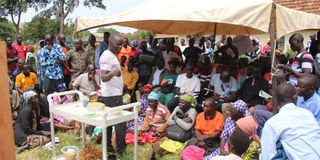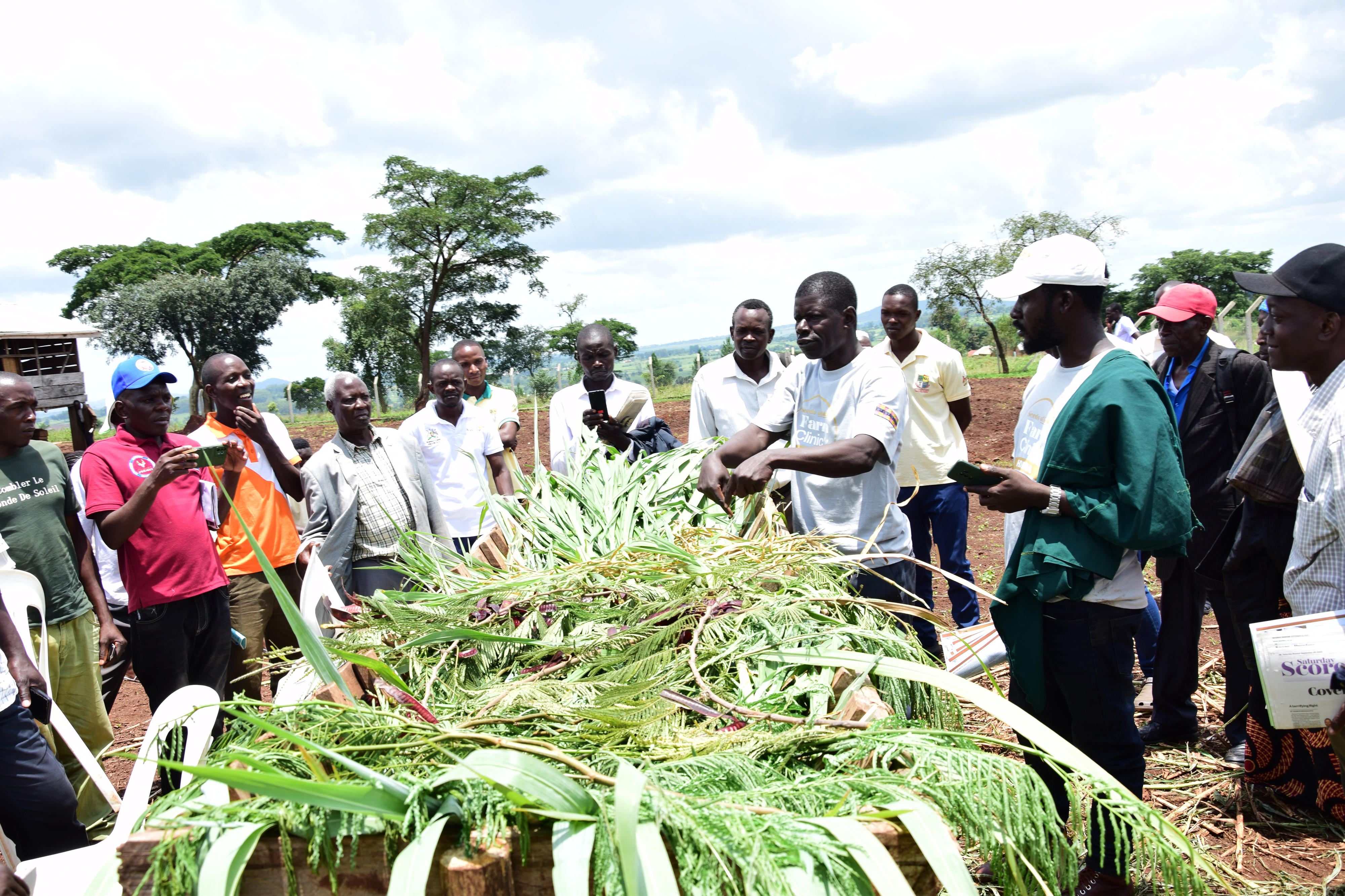Memorable day out at the farm clinic

The soybean farming class was one of the most well attended sessions.
What you need to know:
Dr Laban Turyagyenda, the Director of Ngetta Zardi said the clinic was a good education platform for farmers, and the institution would not hesitate to host it next year.
A tarmac road snakes through Ngetta trading centre in Lira City, to the Ngetta Zardi one of the institutes of National Agricultural Research Organisation (Naro).
The facility, located some 400 metres off the Lira-Kitgum highway, is a rice, cotton, cassava, citrus fruit, fish, maize and soya bean research station.
One drives through a cabro-paved driveway once they enter the centre’s gate. It is here that Seeds of Gold held its 40th farm clinic last Saturday.

Farmers admire the Heifer Interational sustainable dairy farming model.
Training
The gates opened at 7am and farmers from various parts of the country flocked the centre armed with books, pens and questions ready to quench their thirst for agricultural information.
Ready to attend to them were dozens of agriculture experts. And various modern agricultural technologies were also on display, ranging from farm equipment and machinery, new seed varieties and fertilisers.
Dr Barnabas Mudde, a researcher at the Ngetta Zardi, took farmers through best rice farming practices, from planting to harvesting and storage.

Dr Laban Turyagenda the director of Ngetta Zardi addresses the Farm Clinic goers at the institute.
Agronomy
“Conducting a soil test is important. It enables one to know nutritional status of their farm and the kind of fertiliser ingredients one needs such as nitrogen, potassium and calcium,” advised the expert. Soil samples, explained Dr Mudde, should be extracted from at least three different parts of a farm.
“Dig between 0–30cm and collect the soil. Then put in a well-labelled envelop and bring to us or any other institution for analysis,” he said.

Bank of Uganda’s Prossy Namala explains how the Agricultural Credit Fund can benefit smallholder farmers.
To grow rice, according to him, it is first raised in a nursery for 21days. The seedlings are then transplanted in a well-prepared and levelled field.
Basal fertiliser like DAP is then applied. And then first and second topdressing would be done using fertiliser rich in nitrogen at 21 and 42 days after transplanting, respectively.

A cassava expert explains the profitable way of farming cassava.PHOTOS/GEORGE KATONGOLE
According to Dr Mudde, the rice field should be kept flooded with 2-3cm (depth) of water until it reaches physiological maturity.
Water is then drained to allow ripening and drying of the grains for two weeks before harvesting. Common rice disease is blast, while pest is the stalk borer.

The soybean farming class was one of the most well attended sessions.
Questions
Annet Lanyero, a fruit farmer in Kole District, asked how one can control mealybugs. She was afraid of losing her fruits to the pest.
Godfrey Otim, a Naro expert, asked farmers to enhance farm hygiene and adopt preventive measures like scouting of crops for pests to curb invasion. He promised to send extension officers to Lanyero’s farm for effective elimination of the pests.
Otim further explained to farmers the importance of growing an improved dry land cassava to reverse the effects of drought being experienced.

The giant Kalahari goats impressed farmers for their size and potential for supplying meat.
Cost of production
Farmers decried increased cost of production. Beatrice Ajok, a rice grower in Lira District, said she leased an acre this season but was unable to sow because of high production costs. Equally, water has become scarcer, making rice production much expensive, she added.

Tens of farmers arrive for the Seeds of Gold Farm Clinic held at Ngetta Zardi last Saturday.
Brian Omeda from Apach District said he planned to farm soybeans thanks to the clinic after burning her fingers growing tomatoes.
“I have changed my mind after meeting here a farmer doing indigenous crops. I am now certain that is the direction I should take,” stated the farmer.

Flavia Nalubega of Heifer International interacts with farmers at the Farm Clinic in Arua.




